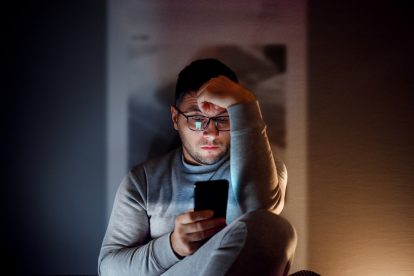Can Isolation Cause Social Anxiety? How Treatment in Community Supports Recovery

When anxiety leads to isolation, a person’s worries can build, and the isolation can also aggravate the disordered experience of anxiety. This relationship can become a dangerous trap for people with social anxiety disorder. Though it may seem counterintuitive, the best treatment for social anxiety is therapy in community, where one’s negative perceptions can transform.
Before getting treatment, Soren’s social anxiety took on an intense life of its own. His anxiety was always very certain of what everyone else was thinking, and they were always very disparaging of him. His anxiety had strong opinions about the events he was invited to attend by friends or for work, and those events were always humiliating disasters waiting to happen. Those opinions got even stronger with time. Eventually, Soren’s anxiety began to immediately dismiss the possibility of going out and socializing whenever an opportunity arose. It felt like a separate mind that he could never detach from. But Soren felt overpowered and hopeless because he believed that insistent voice must be right.
Unfortunately, Soren’s fear led him into deep isolation. But the lack of socialization did not help his fears and anxieties to go away. Isolation is both a symptom and a cause of social anxiety. Someone who feels intense anxiety about interactions with others will avoid these encounters. And someone who spends time only in the company of themselves and their worries will only provoke their anxiety further. Exploring how isolation can cause anxiety helps us to understand the best treatment solutions to inspire confidence and trust.
How Does Anxiety Cause Isolation?
The troubling relationship between isolation and anxiety is a difficult one to heal. For someone with social anxiety, their worries tend to follow them and expand over time. When a social interaction is looming—be it a party with a lot of people expected or a simple trip to the store—they will anticipate the pressure of others’ presence and their own anxiety. If they do go out and participate, the stress in the midst of socialization can be extreme. And after the fact, they may carry that stress away and experience their concerns about people’s judgments growing.
Not only do their fears strongly encourage them to avoid these experiences, they also aren’t able to access the positive advantages of connecting with others. There seem to be many more reasons to avoid people than to engage with them. Of course, avoidance doesn’t alleviate these anxieties, because the real problem is not the social world. The real issue is social anxiety disorder that wants compassionate attention to help transform these fears about socializing.
Call for a Free Confidential Assessment.
877-727-4343Can Isolation Cause Anxiety?
It’s not necessarily true that people with social anxiety want to be and feel alone. Most simply want to not feel the distress that comes with social interactions. They need to not carry around the heavy weight of their fears. But, at the same time, the only way to really alleviate that burden is to discover the path to healthy relationships and social support.
While the goal of withdrawal may be to avoid distress, someone in isolation is also living without the social support that we need as humans. Even if someone has not exhibited symptoms of social anxiety in the past, living in isolation can tip the balance if they begin to feel lonely, uncertain of others’ behaviors and motivations, and unfamiliar with their own ability to interact. Without positive interactions and relationships, it becomes easy to question one’s self-worth and purpose in society. People with social anxiety may come to believe they are alone because they are inherently unlikeable. Social isolation also becomes emotional isolation, and a person has only their own worrisome thoughts to keep them company and help them process their challenges. These doubts and worries breed more pervasive anxiety.
How Can Treatment in Community Pave the Way for Recovery
It’s very important to note that people with social anxiety are not incapable of having healthy, fulfilling relationships. They may worry about other people’s opinions too much and feel the oppressive weight of their own, but their perspective can evolve with help from a compassionate expert. Developing trust for an individual therapist can be a powerful and motivating first step toward recovery. A good working dynamic in therapy begins to challenge one’s view that people generally see them as worthless or unlikeable—and that they are undeserving of support.
Social anxiety is a disorder that is largely overcome with practice. That’s why treatment strategies such as cognitive behavioral therapy (CBT) work so well: because they dismantle the thoughts and behaviors that don’t serve and help to develop awareness and new cognitive behavioral patterns. It’s important, then, for a person to have opportunities to practice these shifts and really internalize the healing.
A residential treatment setting offers a comprehensive range of healing support for people with social anxiety:
- A welcoming community of trained clinicians and peers in recovery
- Regular individual therapy sessions
- Group therapy and community activities
- Opportunities to occasionally withdraw and practice healthy routines for self-care
- Family and couples therapy
- Holistic and experiential therapies
This healing environment promotes an alternate perspective to the one that thrives in isolation. Here, too, clients have the chance to process their anxieties and develop new patterns of thought and behavior at their own pace. Well-rounded support is a given, so they can also practice trust and cooperative dynamics. A community treatment setting is an immersive and interactive opportunity to practice a positive relationship to socialization itself. This is the best chance to transform social anxiety disorder for a brighter, more fulfilling life on the other side of treatment.
Bridges to Recovery offers comprehensive treatment for people struggling with mental health disorders as well as process addictions. Contact us to learn more about our renowned Los Angeles programs and how we can help you or your loved one start on the path to healing.






